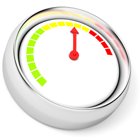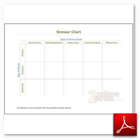What are the Behavioral Effects of Stress?
There are several behavioral effects of stress depending on how much stress you have and what type of person you are ... As always, stress is an individual thing!
In general, the behavioral effects of stress come in 2 states or stages. The short effects and the long effects.
This is the same as the good-stress / bad-stress (eustress and distress). Read more here. In short, the long term behavioral effects come only after a period of stress, while you can see short term behavior effects almost immediately after feel the first stress.
In the long term, however, different behavior can also occur: You may feel stressed all the time and be unable to settle down at all, but you may also feel down all the time and not be able to create any of energy the good stress provides. So...
Short Behavioral Effects of Stress
In the short run your body is preparing itself for action. It is making you focus on the most important things.As a result of this your brain will try and "automate" as much of the non-vital behavior as possible. This is not a bad thing; by nature we humans are creatures of habit.
You may see this automated stress behavior if you took the milk out twice this morning or if you are spinning a pencil in your hand while working.
Note: Smoking can also be short stress behavior, but it is not a healthy habit ;)
I like jumping my leg rapidly on my toes like a dog trying to scratch itself where it can't react. I say "like", but really, I have no control over it. But it is an indicator that I look for and when I observe the stressful behavior, I know I should look out for some of the more serious long term behavioral effects of stress...
Long Behavioral Effects of Stress
If stress is in your life over a period, the behavior effects can create 1 of the 2 following stages. Remember that it is not certain that it will happen to everybody... Stress is individual.A constant stress situation may happen in your body. If this happens; your stress becomes your stress. So it is a constant overproduction of stress hormones and neurochemical in the brain that will not stop even if you take away the actual stressor.
This stage can be very harmful because it can very difficult to observe and recognize the stress. It sort of comes out of nowhere.
A lot of research has been done in this field, and there are typical signs that you can look for:
- An ill temper, often annoyed or easily angry
- Biting or picking your nails or the skin around your fingers
- Grinding your teeth or biting the inside of your mouth
- Rapid speaking
- Overeating or undereating
- Chain smoking
- Touching you face constantly or twisting you hair
- Sexual problems (tiredness, loss of libido etc.)
Stress can have the opposite effects on behavior as well. In the long run, you stress may also cause you to not being able to find the energy at all. You may be feeling tired and uninspired all the time and even getting up in the morning can seem like a huge challenge.
In this state, the body is not able to produce any of the stress responses that we need to keep going and it is a on its way to burnout.
Whether the long term behavioral effect is "understressed" or overstressed, you will need to seek relief. You doctor is as always a good place to start!
Are You a Type A or Type B?
A pattern has been detected in our behavioral response to stress and heart diseases.There are 2 types of "constellations of behavior": A and B.
The type A is people with higher tendency to stress related diseases than type B, and it has all to do with our behavior.
While ...Type A, "is characterized by a continuous, deeply ingrained struggle to overcome real and imagined obstacles imposed by events, other people, and, especially, time" (Friedman and Rosenman)
Type B, "are less driven and competitive, more easygoing—and usually as successful as or more successful than their Type A counterparts!"
Click here to take the Stress Type Test yourself.
Type A behavior can be seen as early as 3 years. It is estimated that almost 50 % of all people have type A behavior.People who show type A behavior are generally more affected by the behavioral effects of stress because they have a stronger response to the stress.
Type A shows generally higher aggressiveness and expects more from themselves than the type B. This, however, creates a negative spiral where type A's perceive their tasks as being more demanding than they are but meanwhile they seek out bigger challenges than type B's.
As an example a type A behavior would be to strive (an often succeed) for the best college or a promotion and meanwhile convincing her/him-self that it is nearly impossible. So they bury themselves in work and stay so focused on the thing they want to achieve. Remember that they are also trying to convince themselves that the task at hand is enormous!...
... The example I describe above is just that - and example! But it is meant to show how the spiral can appear.
A person showing type B behavior are often just as successful as A's, but they achieve their goal in a more laid back manner.
B's generally keep it more casual and do not take on as many stressors as A's. Note that a B can have as many or more stressors, but they will en general not create new ones.
You can take the online Stress Type Test here.
If you want to learn more about other effects of stress, you can go here.

